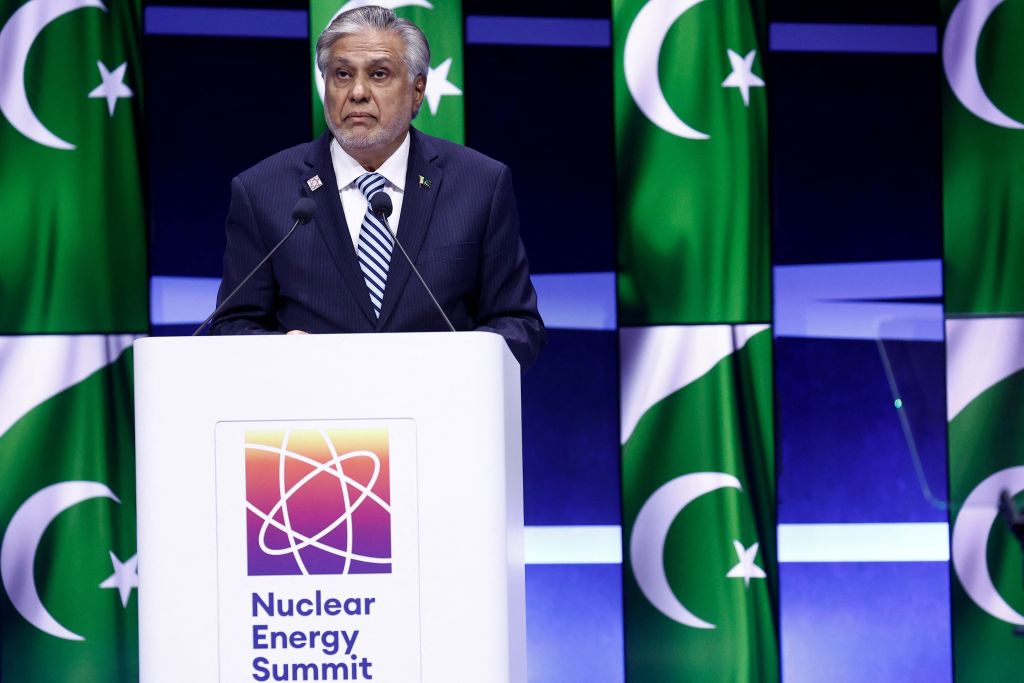- Saturday, July 27, 2024
Islamabad downgraded its diplomatic ties with New Delhi after the Indian government abrogated Article 370 of the country’s Constitution, revoking the special status of the former state of Jammu and Kashmir.

By: Shubham Ghosh
PAKISTANI foreign minister Muhammad Ishaq Dar has announced that his country is contemplating the revival of trade relations with India, which have been inactive since August 2019.
The declaration, made during a press conference in London after attending the Nuclear Energy Summit held in Brussels, Belgium, last week suggests a possible adjustment in Pakistan’s diplomatic approach toward its eastern neighbourand a serious regional rival.
Dar emphasized the keenness of Pakistan’s financially strained business sector to recommence trade operations with India.
“Pakistani businessmen want trade with India to resume,” the foreign minister said on Saturday.
“Pakistan will consider restoring trade ties with India,” he added.
“We will seriously look into matters of trade with India,” Dar was quoted as saying by Pakistan’s The Express Tribune newspaper.
Islamabad downgraded its diplomatic ties with New Delhi after the Indian government abrogated Article 370 of the country’s Constitution, revoking the special status of the former state of Jammu and Kashmir and bifurcating it into two Union Territories — Jammu and Kashmir and Ladakh.
The decision, Islamabad said, undermined the environment for holding talks between the two nuclear-armed neighbours that have fought a number of wars since getting independence in 1947.
The chances of trade with India remains elusive due to lack of consensus among the stakeholders regarding the restoration of trade relations between the two neighbours, The Tribune report added, quoting sources familiar with the development.
Sources told the paper that there was no concrete proposal on the table at this stage regarding the resumption of trade ties between Pakistan and India.
It is believed that there are differences of opinion among the stakeholders regarding the move. Even within the Foreign Office, there are divided views, something sources said was not unusual.
Some are in favour of sticking to Pakistan’s stance that without any major concessions from India, there shouldn’t be any normalisation.
However, others take a more pragmatic and realistic view. They believe Pakistan can take a page out of China’s playbook. China has uneasy ties and border disputes with India, yet this has not deterred the two rivals from trade ties.
While then army chief Gen (retd) Qamar Javed Bajwa was keen to improve ties with India, there is little clarity when it comes to his successor. Some observers think that Dar’s statement on the resumption of ties may have the blessing of the powers that be. The proponents of resuming trade ties with India believe that regional trade could help Pakistan mitigate its economic troubles.
A study conducted by an international financial institution spoke of the great trade potential between Pakistan and India. The study shows that the true trade potential between Pakistan and India could be over $25 billion (£19.7 billion).
Official sources, however, are skeptical about the positive outcome. The Foreign Office thinks Pakistan must wait until the Indian elections, which are scheduled to take place in different phases in April and May. The clear picture would emerge only once a new government is in place in New Delhi in May.
Pakistan has been insisting that the onus of improving the ties was on India and urging it to undo its “unilateral” steps in Kashmir as a sort of pre-condition to start the talks.
India has dismissed the suggestion and made it clear to Pakistan that the entire Union Territories of Jammu and Kashmir and Ladakh were integral and inalienable parts of the country.
New Delhi has also asserted that the constitutional measures taken by the Indian government to ensure socio-economic development and good governance in the Union Territory of Jammu and Kashmir are matters internal to India.
It has been maintaining that it desires normal neighbourly relations with Pakistan while insisting that the onus is on Islamabad to create an environment that is free of terror and hostility for such an engagement.
Despite the frosty ties, the two countries agreed to renew the 2003 ceasefire agreement along the Line of Control (LoC) in February 2021.
Lately, Indian prime minister Narendra Modi in a post on X congratulated Shehbaz Sharif on becoming the head of Pakistan’s government, prompting hopes for a diplomatic thaw.
Sharif responded days later with an equally curt post, thanking Modi for his felicitations.
The Sharif-led coalition government came to power after the February 8 elections but it began its tenure with a dwindling economy which needs immediate improvement.
(With PTI inputs)